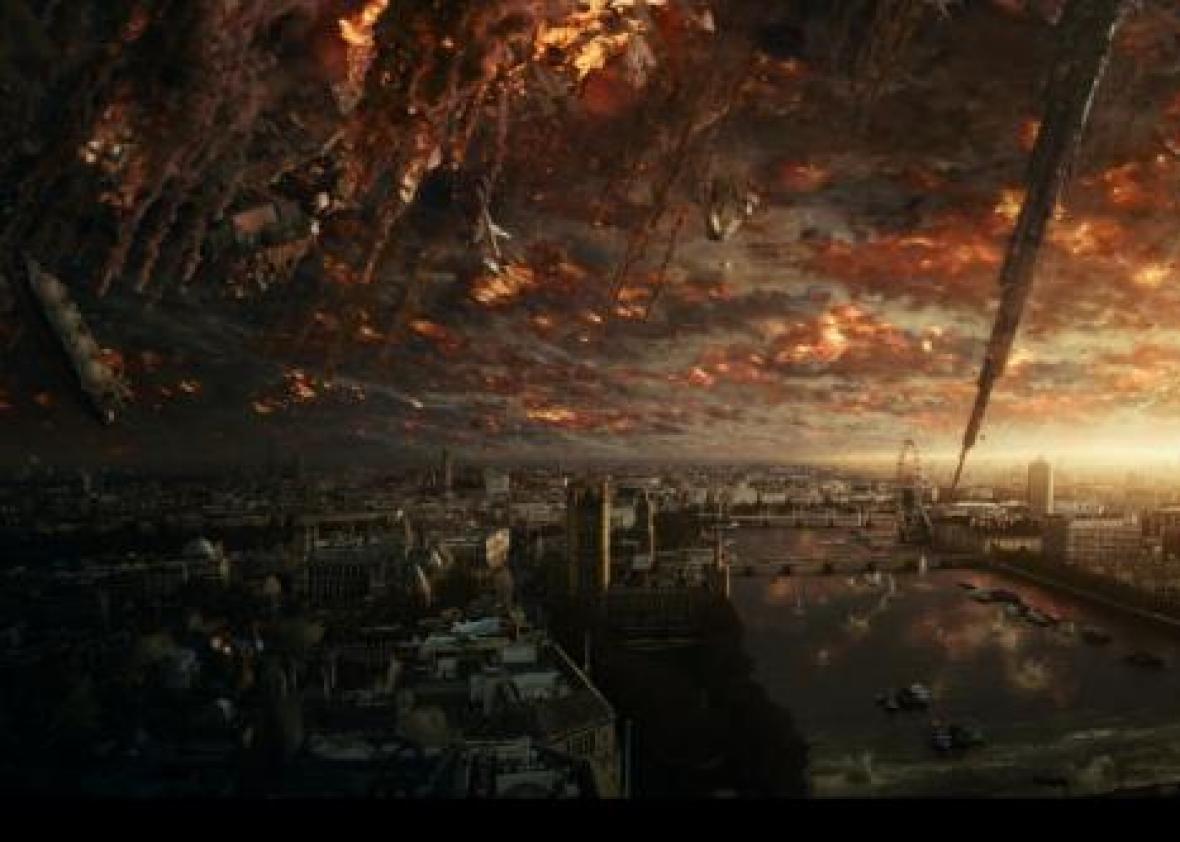Opening this weekend: A sequel to one of the highest-grossing movies of all time, and a movie in which Blake Lively fights a shark. Guess which one isn’t being screened for critics?
Okay, that’s not quite fair: Independence Day: Resurgence, the 20th-anniversary sequel to the movie that ranks 55th on the all-time box-office list, is screening for reviewers in some cities. It’s just that it’s doing so at a Friday morning “courtesy screening,” approximately 15 hours after it opens in multiplexes. And that’s only in the U.S.: Critics in the U.K. and Australia were shown the film earlier this week, and their reviews were posted on Tuesday. But American publications, at least those without critics based in London or Sydney, won’t get a look until tonight—it’s doubtful many will wait until Friday when they can just buy a ticket for an evening showing—which means reviews won’t run until around midnight on the East Coast, and, more importantly, won’t make tomorrow’s print newspapers at all.
Independence Day: Resurgence is not the kind of movie whose opening weekend rides on critical opinion. You liked the first one, you’ll see this one, case closed. But forsaking reviews means giving up a ton of free press. Blockbusters may not need good notices from critics, but they do need audiences to be aware the movie is opening, and every Friday-morning review, especially with the kind of front-page-of-the-arts-section play that Resurgence would almost certainly have gotten, doubles as an advertisement for the movie’s existence. Critics largely loathed Batman v Superman: Dawn of Justice, but it made $170 million in its opening weekend, and that was just in the U.S. (Latest tracking estimates put Resurgence’s domestic take at less than a third of that.) To paraphrase Oscar Wilde, the only thing worse than a bad review is no review.
Even stranger, Resurgence’s overseas reviews have been, if not glowing, at least reasonably mixed. It currently has a Metacritic score of 49, five points higher than Batman v Superman’s, and is 53 percent “Fresh” at Rotten Tomatoes, which is nearly double BvS’s 27 percent. Variety said the movie “confirms director Roland Emmerich as modern cinema’s most spirited conductor of popcorn chaos”—that’s pretty good, right? Foreign critics are sometimes kinder to blockbusters, but if Resurgence is half as chauvinist and gung-ho as the original, you’d think Americans would be more susceptible to it, not less.
It’s not unheard of for studio movies to open without being screened for press, but it’s rare, and the strategy is usually adopted for films with fixed constituencies that studios don’t expect reviews will expand: the last Paranormal Activity, for example, or Tyler Perry movies. Movies of Resurgence’s size are almost always screened for press, even when they’re likely to be panned: The last comparable case was 2013’s G.I. Joe: The Rise of Cobra, and before that, you have to go back as far as 2002’s The Adventures of Pluto Nash. In December, there were rumors that Star Wars: The Force Awakens might not be shown to critics, purportedly because of concerns about advance spoilers, but in the end, the movie was screened the Tuesday before it opened.
The running assumption is that movies held back from press must be stinkers, and that’s often true, but not always, and it’s less tendentious to view this as a business decision. Advance screenings cost money, after all, and it means ceding control of the way your product is positioned in the market to a group—movie critics—whose ability to affect box office one way or another is nebulous at best.
But filmmakers don’t like the implicit stench that attaches to a movie that isn’t shown in advance, especially since it limits the opportunities for other kinds of press exposure. Many outlets won’t run an interview for a movie when an interviewer’s first question has to be, “So, what’s it about?” But Resurgence’s Roland Emmerich may not be too kindly disposed to critics right now, given that his last movie, Stonewall, was savaged for telling the story of the birth of the modern LGBT rights movement through the eyes of a white cis man, sidelining or effacing altogether the key roles played by transwomen and people of color. (He doubled down this week in an interview with the Guardian, saying, “Stonewall was a white event,” and recalling how he was “driven out” of his native Germany by bad reviews.) It’s doubtful that Emmerich has final say over the release strategy for 20th Century Fox’s $200 million investment—no one from the studio was available to comment on the subject—but he might have something to do the fact that U.S. and Canadian critics seem to have been uniquely left out in the cold.
But hey, who needs reviews of Independence Day: Resurgence when you can post a studio-sponsored meme of Jeff Goldblum dressed like Willy Wonka, or go to IndependenceDayMyStreet.com and gaze upon a picture of what your house might look like if was destroyed by aliens? (I used it to blow up 20th Century Fox headquarters: No hard feelings, folks.) Some movie critics have been up in arms about the inconvenience. But there’s an upside, too, in the form of a minor disruption to the status quo in which outlets collectively publish their reviews at a time set by the studio, which can feel like they’re acting as an unofficial arm of the marketing department. The reviews will be reviews a few hours or a few days late, and the world will keep spinning. At least until the UFOs come.
